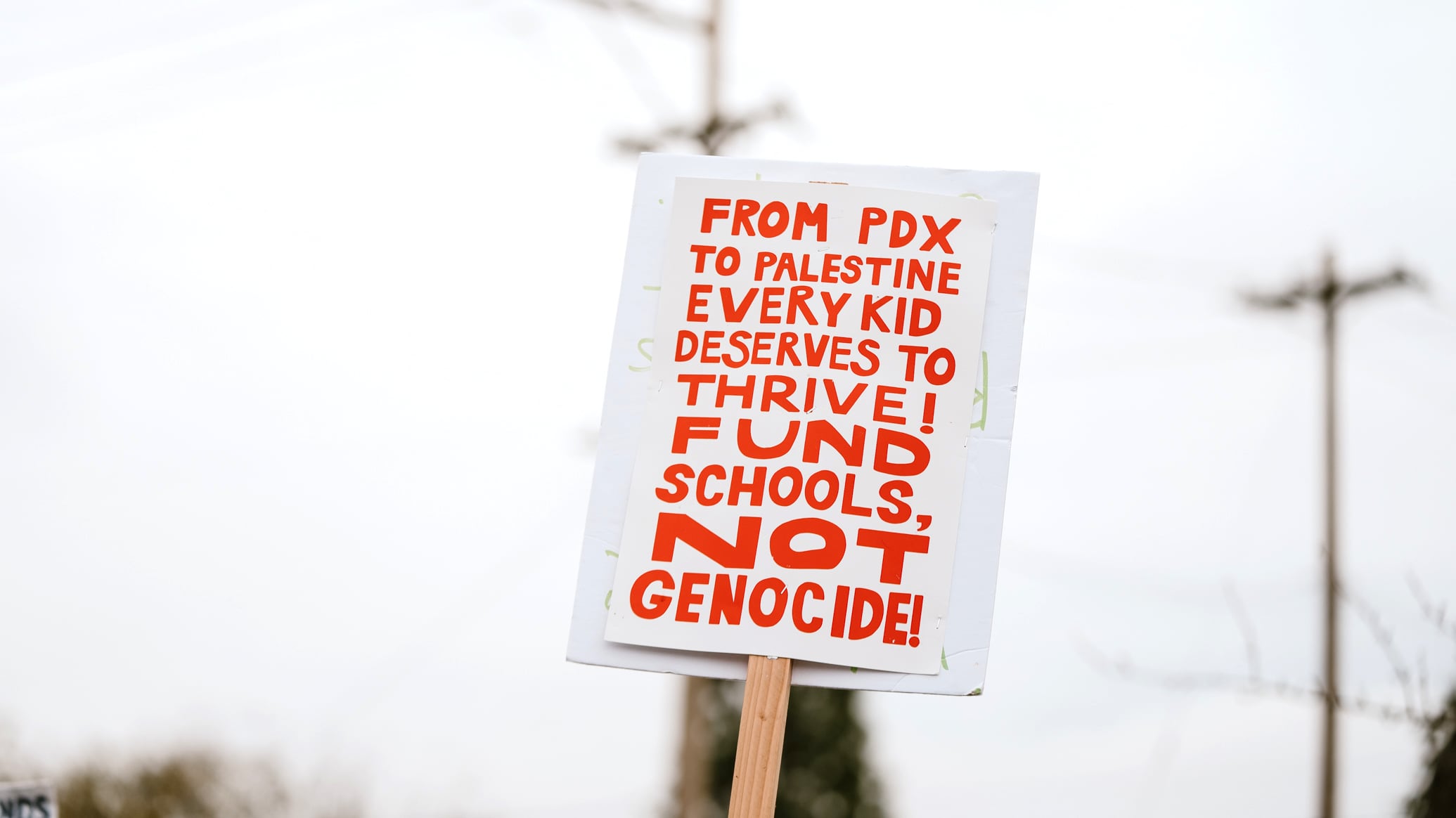Weeks after ending its strike, the Portland Association of Teachers has again placed itself at the center of political controversy. On its social media platforms and at an event held at its headquarters, the teachers’ union has displayed support for Palestine in the Israel-Hamas war.
The union has advertised cease-fire marches and a “Palestine 101″ panel discussion on its Facebook page. On Dec. 10, PAT hosted a “teach-in” at its Northeast Portland headquarters, though the union was not listed as one of the official sponsors of the event on the flyer. The event was held on International Human Rights Day and condemned “U.S.-backed war crimes in Palestine, the Philippines, and around the world,” according to organizers.
Recently retired “Ready to Strike” picket signs leaned in the corner behind the panelists, who sat at a table with a large Palestinian flag taped to it.
Ali, a Portland Public Schools paraeducator who declined to give their last name, attended the event and connected U.S. labor struggles with the fight for human rights.
“It is our responsibility to recognize that our struggles are not an isolated issue: It’s a global structure,” Ali says. “Poor wages and working conditions in other countries are not natural or inevitable—they are by design and the result of military intervention by the U.S. government.”
Some Jewish teachers are irate that their union has been using its social media platforms to take a pro-Palestine stance on the war in Israel and then not adequately engaging with teachers who express reservations.
“I feel betrayed,” says David Goldstein, a Spanish language teacher at Robert Gray Middle School who is Jewish. “It makes me feel like my union doesn’t have my back, and it makes me concerned for the well-being of my Jewish students, their families and also for myself.”
While PAT provided the meeting space, event spokeswoman Julia Fritz-Endres says the Portland Federation of School Professionals was the main union involved, along with about a dozen organizations.
In a statement to WW, PAT president Angela Bonilla writes, “PAT is a democratic organization that represents educators from a range of backgrounds, viewpoints and experiences. PAT’s priority is supporting educators and students and creating safe, welcoming and inclusive spaces for all. We will continue to engage with members respectfully and meaningfully on the challenging issues of our time including this issue.”

After Hamas terrorists led deadly attacks in Israel on Oct. 7, Israel has extensively bombed Gaza in response for two months. The campaign has killed at least 15,000, most of them civilians, according to health authorities in Gaza.
In the U.S., support for Palestine is common and deeply felt in academia, resulting in a series of controversies and congressional hearings around antisemitism on college campuses.
In Oakland, Calif., last week, a group of educators presented pro-Palestinian materials to students as part of an unauthorized teach-in. The event, which was opposed by the city’s school district, included curriculum such as a celebration of Palestinian music, food, and poetry and an alphabet coloring book for elementary students (“I is for Intifada,” “P is for Palestine,”) as reported by The New York Times.
While it has received comparatively little media attention, Portland has also seen an intermingling of the teachers’ union and support for Palestine.
Goldstein noticed pro-Palestinian causes overlapping with PAT events throughout the November teachers strike. There was a pickup truck with Palestinian flags and protesters chanting, “From the river to the sea/Palestine will be free!” at the Nov. 3 march from Lincoln High School to City Hall, he says.
He saw photos of members carrying “Fund Schools, Not Genocide” signs on the picket line. “It was chilling,” he says.
At the entrance to a midstrike PAT meeting, activists handed out flyers asking PAT to call for a cease-fire and advertising pro-Palestinian organizations. (PAT has since signed the U.S. labor movement’s call for a cease-fire in Israel and Palestine after their executive board unanimously voted in favor of signing it.)
On Nov. 14, Goldstein emailed Bonilla and leaders at the Oregon Education Association asking them to stop using the official PAT Facebook page to advertise pro-Palestinian marches. He wrote that other Jewish teachers and families felt “distraught” and “betrayed,” and implored them to “leave our union OUT of this argument.” They did not respond.
“Taking a stance on such a divisive issue and then dismissing concerns brought by a minority group about how this is causing actual harm and contributing to antisemitism? It’s unconscionable,” Goldstein says.
Jennifer Edelson, who teaches English language learners at McDaniel High School and is Jewish, did hear back from PAT leaders. On Nov. 21, PAT vice president Jacque Dixon wrote to her husband: “You’re right there ARE many Jewish people in PAT, including members of our Executive Board.…My brother-in-law and nephew are Palestinian, but I do not feel like I need to write you on their behalf.”
Dixon went on to say the executive board stands firm in its unanimous decision to sign the cease-fire letter and that she is “not personally responsible for the signs” members carry on picket lines. PAT did not distribute the “Fund Schools, Not Genocide” signs to members, Dixon wrote.
“There are millions of people protesting the Israeli occupation of Palestine worldwide,” she concluded. “This will be my last communication with you on this matter.”
Edelson confronted picketers holding genocide signs during the strike, not to challenge their personal beliefs but to question their choice of venue, she says. She suggested they attend a pro-Palestine rally instead.
“It’s not the place,” Edelson says. “We’re not fighting for them; we’re fighting for our schools and our students.”
Since Edelson has been back in the classroom, she has felt supported by McDaniel administration and fellow teachers, who have encouraged her to report anything that makes her feel threatened. However, she walked out of the PAT announcements portion of a recent staff meeting and is tempted to resign from the union, she says.
Frustrated with the response from PAT leaders, teachers and families have reached out to the Jewish Federation of Greater Portland. Bob Horenstein, the organization’s director of community relations, emailed Bonilla about his concerns midstrike. She said she would be open to having further conversation after the strike, but she has not responded to Horenstein’s email and voicemail follow-ups to schedule the meeting.
Horenstein says it was “obtuse” of PAT to wade into international politics and that while he doesn’t believe the union intended to harm some of its Jewish members, it has. A teachers’ union ought to be inclusive of all teachers, regardless of faith, race and nationality, and stay as neutral as possible on topics that affect so many different communities within their ranks, he says.
“What message does it send when the leadership of the union is promoting rallies during which antisemitic slogans are chanted or displayed on signs?” Horenstein says. “They are vilifying Jews, quite frankly.”
